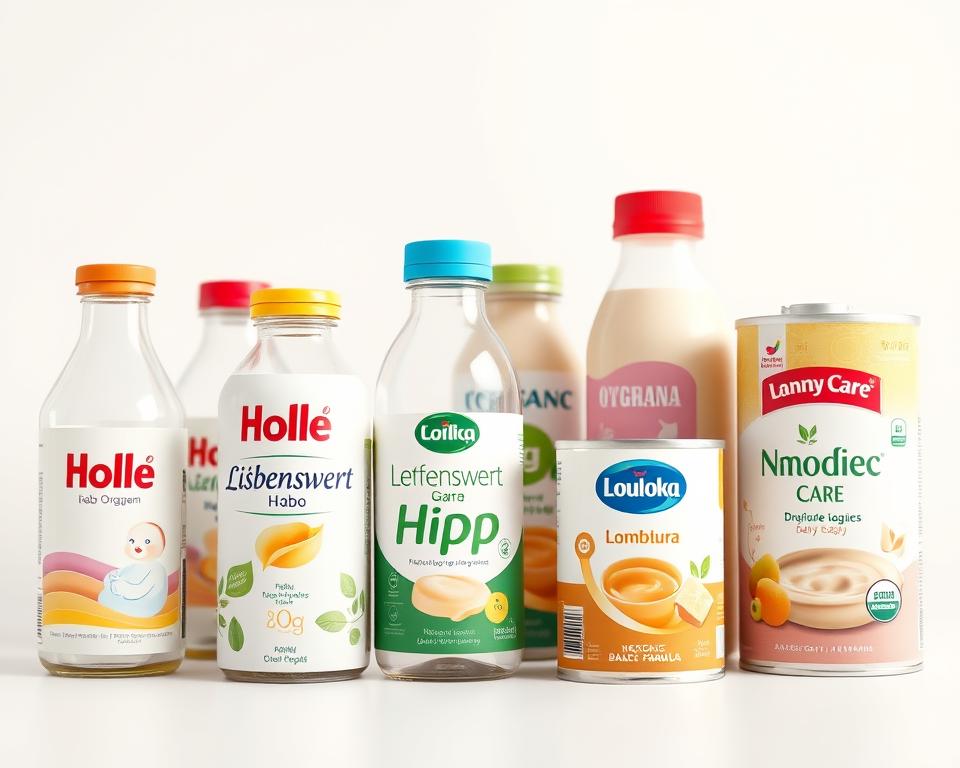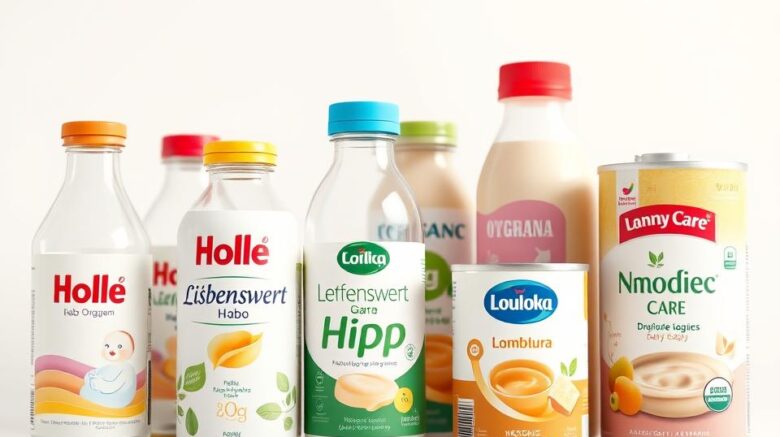Uncover the Best Organic Formula Options: Parental Handbook
Almost eight in ten U.S. moms and dads rely on formula during their baby’s first year. This is often due to breastfeeding challenges. Selecting the proper buy organic newborn formula online proves crucial for such households. This guide aims to assist parents in making informed decisions about the best organic formula for their babies.
We will examine various formulas and brands, focusing on quality and nutrition. These insights are critical for a wholesome infant beginning.
Choosing the right food for your baby is a critical decision for every parent. Organic infant formula has gained popularity due to its focus on organic ingredients. It provides a healthier option for infants. Organic products avoid synthetic pesticides and fertilizers, giving your little one a cleaner start.
Moms and dads value formulas free from GMOs and synthetic extras. Such concerns drive the trend toward organic as a safer nutritional path.
Advantages of Certified Organic Components
Organic ingredients in baby formulas offer significant benefits. Rigorous inspections guarantee their premium standards and security. Picking organic varieties lets caregivers know their baby avoids toxic residues.
Organic farming methods champion eco-friendly and sustainable practices. Thus, organic choices support both your baby’s health and the planet.
Linked Wellness Benefits
These formulas may foster healthier developmental results. Many studies suggest that babies receiving organic nutrition may exhibit fewer gastrointestinal issues and a lower likelihood of allergies. Purity stems from their additive-free makeup.
Moms and dads value how organics deliver complete nourishment. They support both growth and overall wellness for their babies.

Essential Criteria for Choosing Organic Formula
Selecting premier organic infant formula matters dramatically for your child’s wellbeing. Examine both protein origins and vital micronutrients. Protein composition and proportions influence digestibility and nutrient uptake. Also, knowing the essential nutrients ensures your baby gets the best support for growth and development.
Protein Origin and Proportion
Most baby formulas use whey and casein as protein sources. Whey digests readily; casein offers sustained nutrient delivery. A whey-lean blend suits delicate infant digestion. Organic formulas often aim for a higher whey ratio to aid in digestion. Choose products that specify their protein blend and proper proportions.
Key Micronutrients and Enhancements
Critical nutrients make a big difference in formula selection. DHA and ARA are critical for brain and eye health. Prebiotics also play a role in digestive health and immune system strength. Verify the presence of these compounds for comprehensive nutrition. These organics provide robust nutrient profiles.
| Protein Source | Benefits | Whey-to-Casein Ratio |
|---|---|---|
| Whey | Easier digestibility|Gentle on tummies|Quick absorption | Higher ratio is better|Lean whey blend preferred|Above 60% ideal |
| Casein | Slow release of nutrients|Sustained nourishment|Stomach-friendly over time | Lower ratio preferred in early months|Casein kept minimal|Around 40% or less |
Top-Rated Organic Formula Brands
Moms and dads rely on established brands when buying organics. Let’s explore some top choices, highlighting their unique features and standout qualities. They lead the organic formula market, serving diverse dietary demands.
Kendamil: The Whole Milk Option
As the sole whole-milk organic formula, Kendamil stands out. This formula boasts a rich, creamy texture and avoids controversial additives. It’s a top pick for parents who value purity in their baby’s diet. Buying Kendamil online is straightforward and convenient.
HiPP’s Combiotik for Delicate Digestions
Designed to soothe, Combiotik suits babies with sensitive guts. Features both prebiotics and probiotics for digestive support. Families favor HiPP for its top-tier organics and trusted reputation.
Holle’s Biodynamic Organic Formula
Holle Bio is renowned for its biodynamic farming practices, providing premium certified organic formula. It’s known for its rigorous quality control and commitment to health and the environment. Moms and dads pick Holle for its reliable quality and wholesome makeup.
Aussie Bubs’ Pasture-Fed Formula
Its grass-fed milk basis boosts vitamins and minerals naturally. All components reflect a back-to-nature approach. Its grass-fed pedigree signals high standards to parents.
Bobbie: Modern Nutritional Innovations
Bobbie is at the forefront of baby nutrition, blending modernity with thoughtful formulation. Balances modern nutrition science with certified organics. Moms and dads trust Bobbie for its evidence-based, organic formula.
Choosing the right organic formula for your baby requires careful thought about their dietary needs. Understanding their dietary sensitivities is key to finding a formula that supports their health without discomfort. Component choices matter for infants prone to digestive issues.
Identifying Feeding Intolerances
Some babies show intolerance to specific proteins or sugars. It’s vital to seek out products tailored to these needs. For instance, organic formulas for sensitive tummies often have less lactose or proteins that are partially hydrolyzed. These features aim to reduce irritation and aid in digestive health.
Talk with your child’s doctor before switching formulas.
Focusing on Tummy Comfort
Digestive comfort is essential for infants, and the right organic formula is key. These compounds encourage a healthy microbiome and smoother digestion. Supporting microbial balance leads to better digestion and utilization of nutrients.
Organic blends designed for breastfed infants deliver key components.
Guidelines for Formula Transition
You can transition infants from breastfeeding or standard formula to organic smoothly. Knowing the right approach helps both caregiver and infant adjust. Slowly shifting ratios eases acceptance and prevents distress.
Phased Introduction
Start by introducing organic baby formula gradually. Follow these tactics for easy switching:
- Mix ¼ organic into ¾ existing formula to start.
- Slowly tilt the balance until you reach 100% organic.
- Monitor your baby’s reactions closely. If your baby shows signs of discomfort, slow down the process.
- Serve the new formula during calm periods so baby links it with comfort.
- Stick to a feeding routine, as consistency can make the transition smoother.
Indicators of Successful Switching
As you navigate this transition, recognizing signs of good acceptance will provide reassurance:
- Baby nurses or bottles quietly and contentedly.
- Stool patterns stay even, and digestion remains smooth.
- No significant changes in appetite or feeding patterns.
- Infant seems satisfied and relaxed post-feeding.
Successful organic baby formula acceptance can take time, but these signs indicate a positive adjustment to the new nutrition.
Comparing Organic and Regular Custom Formulas
Caregivers often debate organics versus conventional formula for baby’s diet. Making the right pick ensures optimal nutrition for little ones. The focus on ingredient safety and health benefits often guides their choice in this important aspect of parenting.
Composition Breakdown
What goes into each formula type highlights their distinction. Organic formulas opt for natural components, excluding artificial additives, flavors, and preservatives. Names like HiPP, Kendamil partner with organic producers for premium milk. Regular formulas can pack artificial additives and GMO-derived compounds. This highlights the organic formulas’ focus on natural, wholesome nutrition.
Cost Comparison
The price of organic baby formula often reflects the higher standards for ingredient sourcing and production. These formulas cost more because of strict organic compliance fees. Despite the higher cost, many parents see the health benefits as worth the investment. Assessing cost versus benefit guides a balanced purchasing decision.
The rise of online organic formula shops has revolutionized how parents buy organic baby formula. You can shop for the best organics without leaving your house. It enables discovery of specialty formulas for different needs.
Buying Formula Online Perks
E-commerce fits into jam-packed daily routines. Shop at home or on the go with no store trips required.
- Ease of access
- Broad brand offerings via online catalogs
- E-tailer discounts often undercut store prices
Subscription Services Explained
Subscription models now dominate formula provisioning. Automated orders keep your formula supply constant.
Top subscription benefits are:
- Regular shipments keep cabinets full
- Customizable Frequency: Choose how often to receive deliveries based on your family’s needs
- Subscription rates often beat retail prices
Regulations Governing Organic Infant Nutrition
Maintaining high standards for organic formulas involves strict oversight. A web of rules ensures product safety and authenticity. Parents can rest assured knowing that FDA regulations on infant formula ensure safety. The USDA organic certification, on the other hand, verifies the authenticity of organic claims. Awareness of regulations boosts caregiver confidence.
FDA Oversight and Standards
U.S. FDA controls critical aspects of formula manufacturing. Their strict guidelines cover nutrient requirements and permissible ingredients. Such rules guarantee balanced nourishment for infants. Key aspects include:
- Mandatory ingredient listings|Required ingredient disclosures|Compulsory component labeling
- Specific nutrient requirements such as protein, fats, and vitamins|Defined macro- and micronutrient thresholds|Preset nutrition minimums
- Comprehensive quality control measures during manufacturing|Rigorous production inspections|Stringent safety checks
Adherence to these FDA regulations guarantees that only safe, nutritionally adequate products are available.
USDA Organic Requirements
The USDA organic certification is a critical indicator of quality and purity in organic baby formulas. It includes multiple verification steps to ensure compliance. Major requirements are:
- Proof that ingredients are produced without synthetic fertilizers or pesticides|No chemical fertilizers or sprays used|Farm inputs must be 100% natural
- Verification of non-GMO (genetically modified organism) status|Guarantee of GMO-free sourcing|Strict non-GMO testing
- Clear guidelines on the handling and processing of organic products|Protected organic integrity during production|Certified organic processing rules
Organic formulas with USDA certification assure that ingredients come from organic farms. These standards deliver safer, nutrient-rich formulas. The combination of USDA certification with FDA regulations provides parents with confidence in their baby’s nutrition.
| Regulatory Aspect | Description |
|---|---|
| FDA Regulations | Sets safety and nutrient standards for infant formula |
| USDA Organic Certification | Ensures organic ingredients are grown without harmful substances |
| Quality Control | Mandatory checks during production processes |
| Ingredient Transparency | Clear labeling of all components for consumer knowledge |
Buying Guide for Organic Formulas
Selecting the optimal organic formula might feel overwhelming. However, these pointers help caregivers choose with confidence. Knowing where to shop and what to look for in labels makes the process smoother.
Where to Buy Organic Baby Formula Online
Numerous reputable e-retailers stock certified organics. You’ll find periodic discounts online. Consider these popular options:
- Amazon – Known for its wide variety and fast shipping
- Target – Offers convenient delivery options and in-store pickup
- Walmart – Provides both online shopping and local availability
- Thrive Market – Curates wellness-oriented selections
Review shopper comments for real-world insights. They help assess the product’s quality and the retailer’s reliability.
Decoding Labels and Seals
Understanding labels and certifications is vital when buying organic baby formula. Check for recognized organic marks. Typical certifications are:
| Certification | Description |
|---|---|
| USDA Organic | Indicates the formula contains at least 95% organic ingredients |
| Non-GMO Project Verified | Means the formula does not use genetically modified organisms |
| European Union Organic | Denotes adherence to EU organic farming regulations |
Identifying labels confirms both safety and quality.
In Closing
To wrap up, careful formula selection supports optimal baby development. Certified organic formulas guarantee comprehensive infant care. It provides vital nutrients without harmful additives. Parents have discovered key factors to consider, such as protein sources, dietary sensitivities, and the reputation of brands like Kendamil, HiPP Combiotik, and Holle Bio.
We emphasized matching formula to individual infant requirements. Switching to organics requires a thoughtful approach. Incremental change safeguards digestive ease.
Using these insights helps caregivers navigate the crowded formula field. Choosing organics lays a foundation for enduring wellness. Keep championing top-tier infant nutrition. Ensure every tiny step toward solid foods starts with safe, wholesome options.
